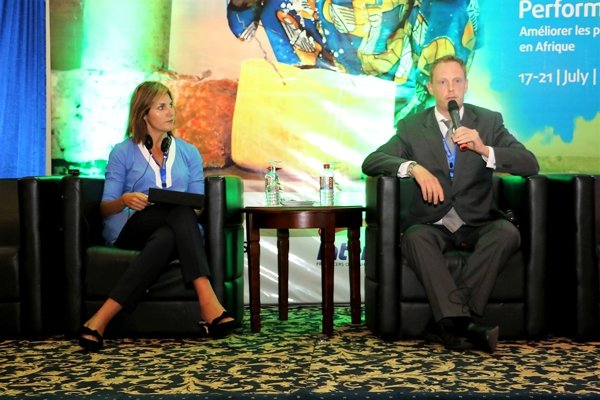Cheryl Hicks, Executive Director of TBC and David Smith, Director of WE&B
On Monday, July 17, 2017 at the African Water Association’s 77th Scientific and Technical Meetings in Accra Ghana, two presenters who discussed the challenges and perspectives of the African WASH sector, from their work with the Toilet Board Coalition (TBC) and AfriAlliance. Both agreed that partnerships and cooperation were the key to moving forward successfully.
Cheryl Hicks, Executive Director of TBC, shared their model of looking at sanitation as a business. Founded by businesses, TBC looks at what changes must be made to products used in toilets, such as cleaners and sanitary pads, but also to determine what resources are available. The language of waste generally makes people think that it must be thrown away, but really it is a system of abundant resources.
For example, there is the opportunity to upcycle organic sludge to biogas, fertilizer or protein sources for livestock. This initiative is especially important as companies look to become zero waste and carbon positive. The hospitality, agriculture, energy, water, ICT and consumer health industries are very interested in sanitation and providing investment.
TBC are business model and innovation experts, helping companies get to scale and valorize products. They are not sanitation experts, but broker partnerships between large companies and local solutions to bring unique assets together. Large companies understand hyper-efficiency and pricing, but must meet the local context and better address people’s needs. She clarified that the private sector does not want to take over, just accelerate the pace of change, and expand new product opportunities to unaccessed customers. Hicks concluded by discussing their partnership with up-and-coming small companies Safisana in Ghana, Sanergy in Kenya and Biocycle in South Africa.
David Smith, Director of WE&B, discussed the AfriAlliance initiative’s role in trying to mitigate the impact of climate change on WASH challenges through short-term innovation and long-term research on the water and climate nexus. AfriAlliance also aims to build interactions between African and European networks by mapping these networks to determine potential partners and bring together innovators and investors.
AfriAlliance is also working towards minimizing knowledge fragmentation through knowledge sharing and technology transfer. The Action Groups are a great example of this in action, as they are a place for African and European stakeholders to work together towards implementable solutions in thematic fields. Action groups determine how long they will stay active and therefore can continue after the project’s completion. The next five groups will be launched next year after proposals have been reviewed.
AfriAlliance program is an EU initiative funded under the Horizon 2020 innovative research program. It is implemented by a consortium of 16 partner among which 9 African (AfWA) and 7 European partners for 5 years: (2016-2020). The main objective of AfriAlliance is for African and European stakeholders to work together in the areas of water innovation, research, policy, and capacity development in order to increase the preparedness of Africa for future Climate Change vulnerabilities.

 English
English  Français
Français 
